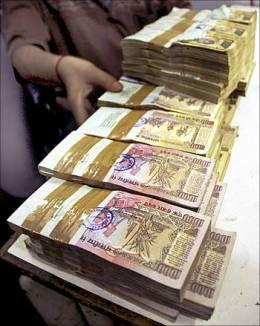 As their currency rates witness a sharp decline against the US dollar, ‘serious tremors’ have been generated in India and many other emerging markets, the Bank for International Settlements has said.
As their currency rates witness a sharp decline against the US dollar, ‘serious tremors’ have been generated in India and many other emerging markets, the Bank for International Settlements has said.
According to a new report published by Switzerland-based BIS, which is also referred as ‘bank for central banks’, the US Federal Reserve's announcement of a possible phasing out of easy money regime has resulted in ‘abrupt and sizeable’ equity market losses in both advanced and emerging markets.
Besides, it has also caused steep falls in domestic currencies of many emerging countries including India.
"The market-led tightening of financial conditions generated serious tremors in emerging market economies, which had been in a soft spot," the BIS said in its latest Quarterly Review Report.
Observing that the outlook for these economies was deteriorating, the BIS said the ‘imported tightening thus amplified pressures on local markets and brought to the fore the vulnerability of countries dependent on fickle foreign capital".
"In the face of additional strong headwinds from escalating geopolitical tensions, the downward pressure on currency and equity values persisted in a number of emerging economies even after the sell-off had abated in advanced economies," it added.
Noting that losses in emerging markets were much larger, BIS said the yield on the composite emerging market high-yield index jumped 130 basis points while the equity indices of the BRIC economies lost 3-13 per cent of their local currency values between May 3 and July 5.
"Over the same period, the currencies of Brazil, India and Russia depreciated by roughly 10 per cent with respect to the US dollar," the report said.
Indian rupee touched an all-time low of 68.85 against the American dollar on August 28.
According to BIS, investors zeroed in on countries with large current account deficits that are especially vulnerable to sudden capital outflows.
"Indeed, countries with high deficits, such as Brazil, India, Indonesia, South Africa and Turkey, experienced the sharpest currency depreciations.
". . . As the negative outlook for India was reinforced by reports of rising bad loans at local banks, the rupee fell to an all-time low vis-à-vis
the US dollar in late August," the report said.
Similarly, Brazil and Indonesia witnessed significant pressures in their financial markets.
The BIS said a number of central and eastern European countries benefited, as investors perceived them to be relative safe havens among emerging market economies.
"This was due to these countries' better current account balances, as well as their greater reliance on exports to the euro area, which had shown signs of recovery," it said.
As per BIS, in the case of some countries, including India, having high current account deficits, high domestic inflation exacerbated the situation.
"At end-August, year-on-year Wholesale Price Index inflation in India was close to 6 per cent and Consumer Price Index inflation in Indonesia and Turkey was above 8 per cent, partly because of significant currency depreciations that had raised import costs," the report said.
High rates of inflation may in turn lead to additional nominal depreciation, thereby fuelling a vicious circle, it added.
"With emerging market authorities facing challenges on several fronts, their main policy responses aimed at curbing the depreciation of domestic currencies," BIS said.
In the face of rapidly declining investor confidence, BIS said the Reserve Bank of India intervened to put upward pressure on money market interest rates and imposed capital controls.
"By late August, however, there were few signs that this had slowed the pace of the rupee's depreciation," it said.
To stymie the fall in rupee, the Indian government has also announced long-term measures to contain the current account deficit, including taxes on silver and gold imports, and steps to liberalise iron ore exports as well as reducing the country's dependence on imported coal.
Without naming any particular country, BIS also said that sizeable foreign exchange interventions of several central banks contributed to significant reductions in official foreign reserves over the past few months.
Not just India, central banks of emerging nations such as Indonesia, Turkey and Brazil raised policy rates and intervened in foreign exchange markets.
These efforts were aimed to reduce the outflow of foreign capital and stabilise their domestic currencies.
© Copyright 2024 PTI. All rights reserved. Republication or redistribution of PTI content, including by framing or similar means, is expressly prohibited without the prior written consent.

 As their currency rates witness a sharp decline against the US dollar, ‘serious tremors’ have been generated in India and many other emerging markets, the Bank for International Settlements has said.
As their currency rates witness a sharp decline against the US dollar, ‘serious tremors’ have been generated in India and many other emerging markets, the Bank for International Settlements has said.